When I first heard about Grand Austria Hotel, I was immediately drawn to it. I watched the Rahdo Runs Through of the game and knew that I had to have it. I was so excited that I convinced my fiancé to walk in the cold Canadian winter back to where he had already bought games from earlier that day because I found out they had a copy. We brought it to a friend’s house to play a few days later and I was instantly hooked.
How Grand Austria Hotel Works
Grand Austria Hotel is a dice drafting game where you are trying to fill your hotel with guests. But before they can check in, there are some things you’ll need to do. Obviously, you have to prepare their room. You start with three rooms prepared before you open for business (start the game), but a successful hotel needs more than 3 guests, so you’ll be busy working on that. You also need to feed your guests. Depending on how fancy they are they may want a simple strudel with a glass of wine, or some cake and a cup of coffee.
To prepare your hotel and feed your guests you’ll need the right dice. The dice drafting mechanic in this game is quite interesting. Depending on player count, 8 to 12 dice are rolled at the beginning of each of the 7 rounds. Each action space is linked to a die number and only the actions that have had their numbers rolled will be available that round. The dice also determine how many of the specified actions can be taken. For example, if there are three dice that show a 1, a player that selects a 1 can take three food items from the general supply. In each round, a player gets to take 2 dice, with player order snaking from first player to last, and back. If the action a player wants isn’t available they have two options: pay 1 dollar to take a 6 and use it as any action, or pass for the current dice. If you pass, once everyone has taken their turns for the round, you temporarily remove one die, reroll the remaining ones, and hope that you get what you need.

In the above example, a player could take one strudel, a combination of 3 red wine/coffee, prepare 1 room, gain a combination of 4 dollars/emperor points, hire a staff card a $2 discount, or pay $1 to do any action 3 times.
To make the drafting fair, the first player rotates every round. One of the simple design aspects that helps elevate this game are the player order tokens. Each player gets a token with two dice spaces. Each space has a number and whoever has the lowest number showing is the active player, these tokens rotate after each round. It’s so clear and great.
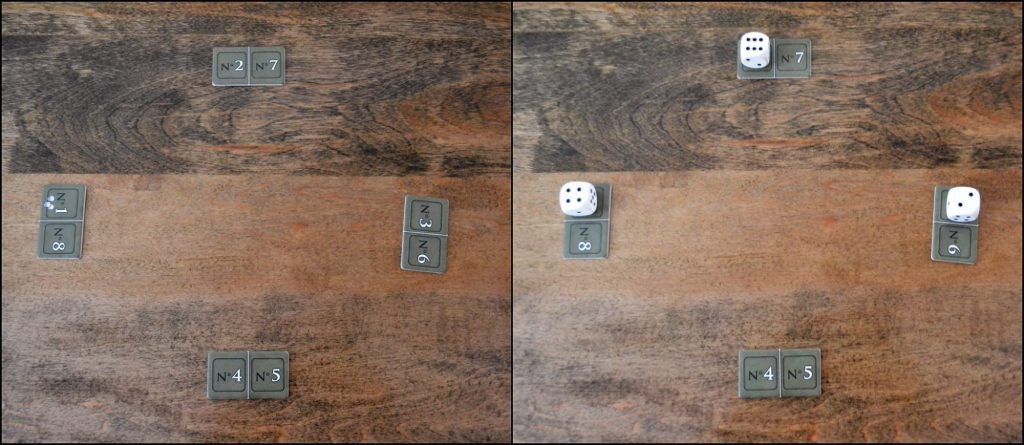
Guest Cards
Depending on what colour the guest card is, they will want different rooms. The red, blue, and yellow cards all need rooms of their respective colours. Green cards, or tourists, will stay in any room. Guests will want any number of things to eat before they stay in your hotel. They may require only one cup of wine before the check in, or maybe they will want 4 slices of cake. Once they’re fed and their room is ready, a guest card can be checked in. At this point you will get the reward they give, which will be some number of victory points and an additional reward such as an action or bonus. Depending on how easy the guest’s requirements are to fulfill, these benefits will range from so so to really great. Some guest cards include fun little Easter eggs with call-outs to the designers’ other games. While this doesn’t affect game play, it is a nice detail.
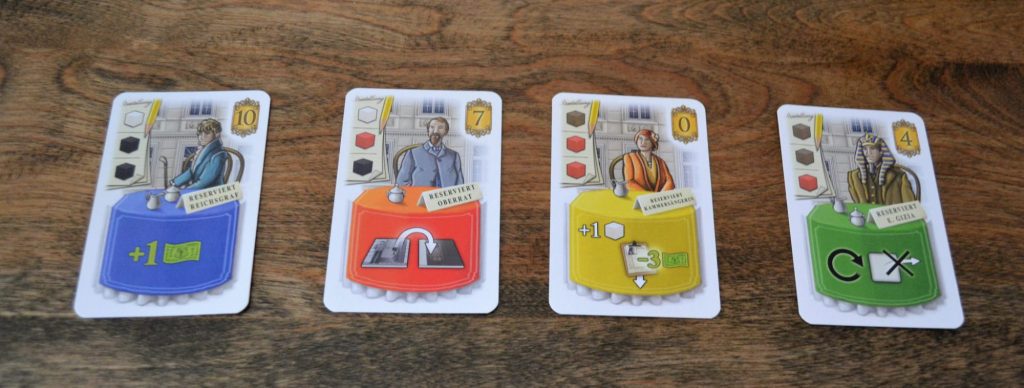
Staff Cards
You might want to hire some staff to help you run your hotel and handle the more demanding customers. You will start with 6 staff cards that you are able to hire and you may draw more depending on certain bonuses during the game. There is an advanced variant in which players draft their starting staff cards, which I think is great, but for your first play I would just go with the 6 random cards. These staff cards will activate once when they are played, once a round, always, or at end game. Staff cards are really helpful if you can figure out what they do. On some of them the iconography is clear, on others not so much. Luckily there is a full list in the rule book of what these staff cards do. If you can manage to read the name on the card, then you can probably figure out what that card will let you do. There are some cases where the explanation in the rule book and the iconography contradict each other. This is really my major criticism of the game — the translation of the English rule book has some problems.

Depending on your strategy, you may lean towards certain cards, but endgame staff cards are very important. Many of them will give you up to 10-15 points, which is significant especially if you have a few of them.
Prestige and the Emperor
A grand hotel, whether in Austria or Budapest, is about more than just guests. It’s also about showing off to the emperor. Your hotel will be evaluated three times throughout the game (at the end of rounds 3, 5 and 7) and depending on how pleased the emperor is by your hotel, you will likely get some points, and maybe a bonus. If the emperor is pleased, you will get a nice reward. If he is unhappy, you will be punished. There is also a neutral zone where you will neither be punished nor rewarded. Basically, ignoring the emperor is not a good idea.
During the setup of the game, three random Prestige Cards will be revealed. Each card will have a different goal such as having a certain combination of rooms filled or being very rich. Each card rewards 15 points to the first player to complete them, while second and third place receive 10 and 5 points respectively. These cards can make a huge difference in your score and they give you goals to work towards.
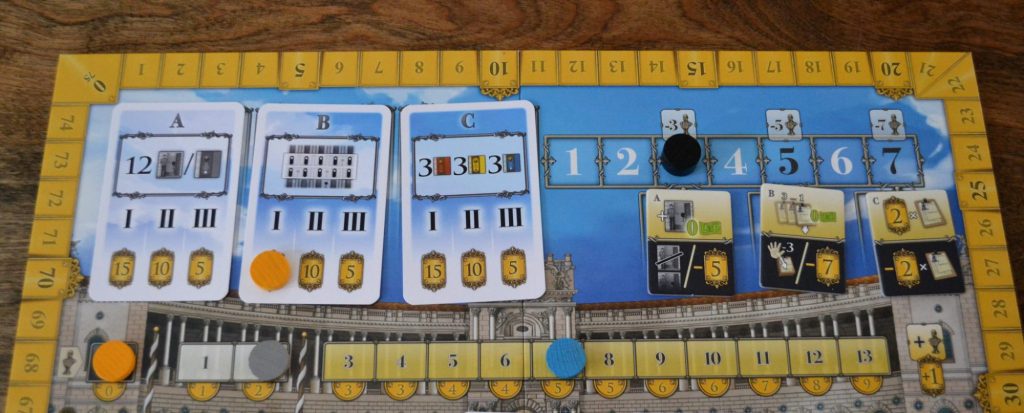
Thoughts
A common criticism I’ve heard for Grand Austria Hotel is that there is too much downtime in a 4-player game. If you are start player in a 4-player game, you will have to wait 6 turns between taking your first and second die. Since this is a little tricky to picture, the diagram below might be helpful. In my opinion, this is a fair criticism but I don’t think the downtime takes away from the game. I use this time to plan for my next turn. I should note that a lot can change during this downtime, so planning can be difficult. But I find that to be part of the fun. You never know what dice other players will take. Sometimes though, with the right staff cards you can craft a plan that doesn’t depend on what other players do, and that’s really quite fun.
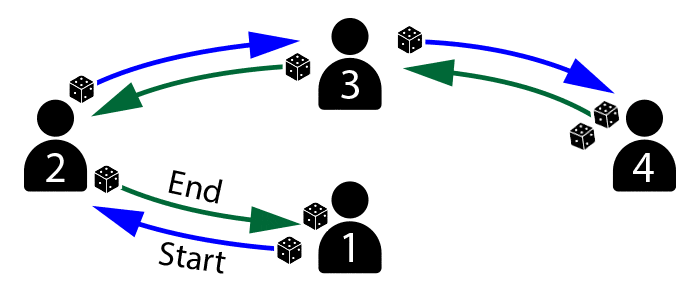
I’ve played Grand Austria Hotel at all player counts, and while it might not be the most popular opinion, I prefer it at 4-players because I like the combos that the amount of dice allow for you to use. With fewer players, the number of dice used decreases. This makes sense since there are less people drafting dice. When all the dice are in play you are more likely to get that precious coffee or elusive cake. I’ll happily take the extra downtime if it means I get to have that one great turn where I jump up 40 points and everyone is amazed.
In this game, there are a lot of different ways to get points and one very unforgiving way to lose them. The emperor track is so important. It’s not just that you aren’t getting points on rounds 3, 5 and 7 if you screw up, you could be getting a pretty bad punishment (like having all the food taken out of your kitchen). To me, Grand Austria Hotel is a balancing act of getting prestige points, filling your hotel, and pleasing the emperor. A fun challenge might be throwing balance to the wind and just focusing heavily on one point gaining strategy, but I I don’t think you’d be able to beat my highest score with that plan!
Grand Austria Hotel is one of my all-time favourite games and every time I’ve played it I’ve had a different experience. The game integrates features to allow for replayability such as reversible asymmetric player boards and variations in setup. You can also have a very different experience depending on what emperor goals and prestige cards are active for a game. When playing with experienced players, drafting your starting staff cards gives you a little more control over your goals for end game scoring. Finally, depending on player count it can seem like a significantly different game. While I wasn’t the one who trekked through the frigid Canadian winter on foot to get it, I think it was definitely worth it.
Six Month Update
Q: Have I played the game since the review was published?
A: Yes I have. Only once, but that’s just because I haven’t had the right opportunity. I’ve played the game over a dozen times and look forward to my next play, which will hopefully be soon!


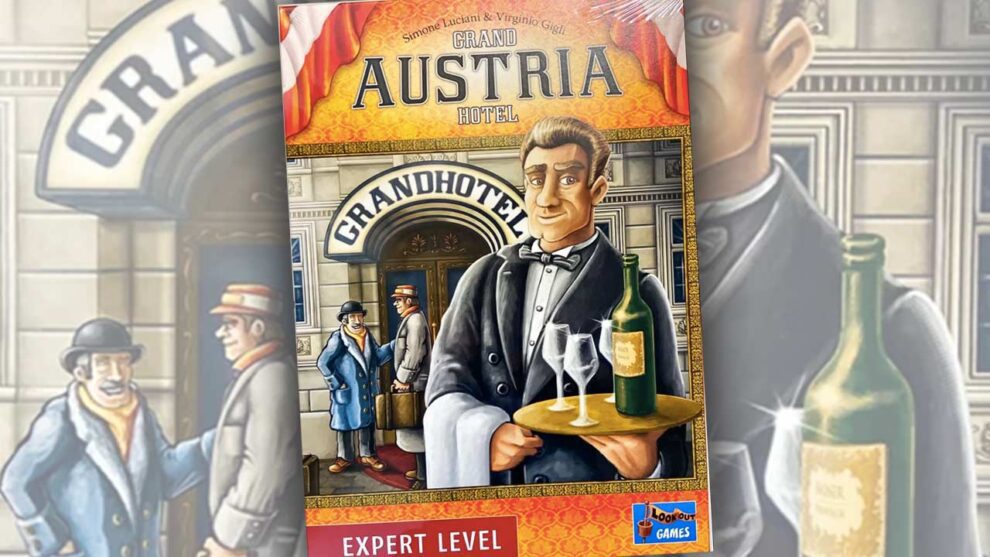

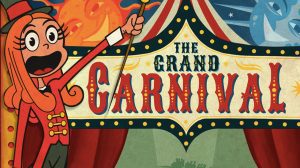







Add Comment